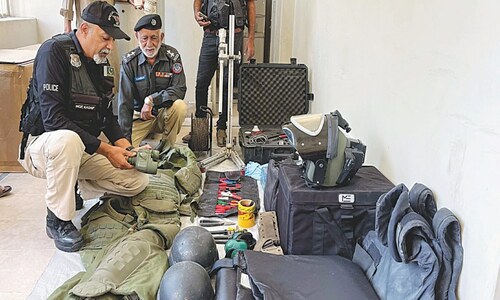
IN Islamic world, there have rarely been any scholars in the modern age that can truly be described as a confluence of eastern and western rivers of knowledge. Still rarer are scholars with modern and western education, and a profound knowledge of Islam with an eye on modern research techniques, Islamic history and related fields in different western and eastern languages. Prof Dr Moulvi Muhammad Shafi was among those rare persons: a polymath known as the walking encyclopaedia of Islam.
Muhammad Shafi was born in Kasur, Punjab, on Aug 6, 1883. Having done his MA in English from F.C. College (Lahore) and MA in Arabic from Punjab University, Moulvi Muhammad Shafi briefly worked for the Punjab education department and taught at different colleges between 1905 and 1915. Going to Cambridge University on scholarship for higher education enhanced his acumen in research methodology and broadened his views.
During his stay in England, from 1915 to 1919, he greatly benefitted from some renowned scholars such as Prof Anthony Ashley Bevan, Prof R.A. Nicholson and Prof E. G. Browne. Browne acknowledged Muhammad Shafi’s helping hand in the preface to his famous Literary History of Persia. At Cambridge, he studied oriental languages and their literature, including Arabic, Persian, Turkish and Hebrew. At Cambridge he taught for about a year as a Teacher of Hindustani (Urdu). On his return to Lahore, he was made head of the Arabic department at Punjab University, a post that he held till 1942. Later, he served as principal and dean of Punjab University Oriental College.
One of the most prominent and admirable services that Prof Muhammad Shafi rendered was heading, as chairman, the project of Urdu Encyclopaedia of Islam. In fact, it was him who envisioned such an encyclopaedia. The idea of compiling a comprehensive and authentic Encyclopaedia of Islam in Urdu can be traced back to 1938, when the first edition of Encyclopaedia of Islam in the English language was completed and published from Leiden, Netherlands. Beginning in 1913, it was considered the most authentic and most comprehensive one and was based on research works published in European languages as well as Arabic, Persian and Turkish. At that time it was felt that almost every major language of the world possessed a work of this nature except Urdu. Allama Iqbal, too, when asked for his advice by the Turkish authorities, had suggested that they should benefit from Leiden’s Encyclopaedia of Islam for compiling such an encyclopaedia in the Turkish language. In 1940, Dr Shafi asked his student Dr Syed Abdullah, then a lecturer at the oriental college, to chalk out a plan. But, alas, the University of Punjab did not approve of it, and the plan was shelved.
After creation of Pakistan, they felt that it was the time to present the idea again and after the long discussions, the project was approved. In 1950, the department of Urdu encyclopaedia of Islam was established at Punjab University, with Prof Shafi as chairman, a post that he held till his death in 1963. After him, Dr Syed Abdullah was asked to fill his shoes, a job that Syed Abdullah did quite well. The first phase of the project was completed in 1992. It is a great achievement of the University of the Punjab and a matter of pride for Pakistan and Urdu. It is an endeavor to produce an authoritative resource book on Islam and other related topics in Urdu. The complete encyclopaedia consists of 24 volumes (26 parts) covering more than 1000 (one thousand) topics on Islam and Islamic World. The department has compiled and published a shorter version of Urdu Encyclopaedia of Islam in one volume and the department has produced a separate volume on Searat-ul-Nabi, entitled Searat-i-Khair-ul-Anam, also translated into Arabic. Now the department is compiling supplements of the main text and first two volumes have been completed. A team of Pakistani and foreign experts had been associated with the project for quite long.
A researcher who loved to collate rare manuscripts and an authority on oriental languages and textual criticism, Moulvi Muhammad Shafi had a keen eye for calligraphy, lexicography, bibliography, grammar, history and archeology, not to mention the languages he knew.
Some of his books, written or edited, in different languages, are Maqalat-i-ilmi-o-deeni, Maqalat-i-Moulvi Muhammad Shafi (in five volumes), Kitab-ul-iqd-ul-Fareed, Maikhana, Masnavi-i-Vamiq-o-Azra, Kashf-ul-mahjoob, Aulia-i-Kasur, Sanadeed-i-Sindh, Yaad daasht-i- Allama Muhammad Shafi. Some of his works remain unpublished.
Prof Dr Moulvi Muhammad Shafi died in Lahore on March 14, 1963. Though this walking encyclopaedia of Islam was buried, the encyclopaedia, his brain child and monumental research work, will keep on guiding the lovers of knowledge.
Published in Dawn, March 12th, 2018













































Dear visitor, the comments section is undergoing an overhaul and will return soon.